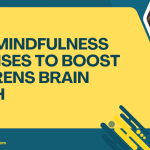Table of Contents
- Introduction
- 1. Provide a Nutrient-Rich Diet
- 2. Encourage Play and Exploration
- 3. Foster a Love for Reading
- 4. Promote Positive Social Interactions
- 5. Establish a Consistent Routine
- FAQs
- Conclusion
Introduction
As parents, we all want what’s best for our children, including their cognitive development. Did you know that certain everyday activities and choices can significantly influence your child’s brain growth? In this article, we’ll explore five essential tips that can help nurture your child’s brain development in a fun and engaging way. Let’s dive in!
1. Provide a Nutrient-Rich Diet
A balanced diet is the foundation of brain health. Foods rich in omega-3 fatty acids, antioxidants, and vitamins play a critical role in cognitive function. Here’s a quick reference table of brain-boosting foods:
| Food | Nutrient | Benefit |
|---|---|---|
| Fatty Fish | Omega-3 Fatty Acids | Supports brain structure and function |
| Blueberries | Antioxidants | Protects brain from oxidative stress |
| Leafy Greens | Vitamins E & K | Improves cognitive function |
| Eggs | Choline | Essential for memory and mood |
| Nuts & Seeds | Vitamin E & Omega-3 | Supports brain cell communication |
Incorporate these foods into your child’s meals to foster a healthy brain environment. For more detailed insights, you might find this resource from the Harvard School of Public Health useful. Additionally, consider exploring the Top 5 Foods to Enhance Your Brain Health Naturally for more ideas.
2. Encourage Play and Exploration
Children learn and grow through play. Whether it’s imaginative games, outdoor activities, or hands-on experiments, play stimulates brain development. Here are a few ways to encourage exploration:
- Outdoor Adventures: Nature walks or trips to the park can foster curiosity and observation skills.
- Creative Crafts: Activities like painting or building with blocks promote problem-solving and fine motor skills.
- Imaginative Role-Playing: Allow your child to take on different roles; it enhances creativity and emotional intelligence.
Remember, play should be both structured and unstructured. Creating a balance allows for both guided learning and free exploration. For insights on how to incorporate neuro care into your child’s routine, check out Top 5 Ways to Integrate Neuro Care into Your Wellness Routine.
3. Foster a Love for Reading
Reading is one of the most beneficial activities for brain growth. It enhances vocabulary, comprehension, and critical thinking skills. Here’s how to instill a love for reading:
- Start Early: Introduce books to your child from infancy. Reading aloud to them creates a bond and stimulates brain activity.
- Create a Reading Space: Designate a cozy corner with books and comfortable seating to make reading enjoyable.
- Diverse Genres: Expose your child to various genres, from fairy tales to science fiction, to broaden their imagination.
According to the American Academy of Pediatrics, reading can significantly influence children’s language development and cognitive skills. For more insights on cognitive training exercises, look into Top 5 Cognitive Training Exercises to Boost Brain Health.
4. Promote Positive Social Interactions
Social interactions play a crucial role in cognitive growth. Engaging with peers helps develop essential life skills such as empathy, communication, and teamwork. Here are strategies to enhance social interactions:
- Playdates: Organize regular gatherings with peers to encourage sharing and collaboration.
- Group Activities: Enroll your child in team sports or group classes like dance or art, which foster teamwork and social skills.
- Model Positive Behavior: Demonstrate empathy and active listening in your interactions to teach your child the importance of these skills.
Positive social experiences can lead to improved emotional well-being and cognitive development. For more on enhancing family support, see Top 5 Ways Family Support Enhances Neuro Recovery.
5. Establish a Consistent Routine
Children thrive on consistency. A well-structured routine can reduce anxiety and improve focus, leading to better brain function. Here’s how to create an effective routine:
- Daily Schedule: Set regular times for meals, homework, and bedtime to create predictability.
- Incorporate Learning Time: Designate specific times for educational activities, such as reading or puzzles.
- Limit Screen Time: Establish rules around screen use to encourage other activities that promote brain growth.
A consistent routine not only helps children feel secure but also optimizes their learning environment. For additional tips on lifestyle changes that promote brain health, check Top 5 Lifestyle Changes for Better Neuro Health.
FAQs
1. How can I tell if my child is developing normally?
Every child develops at their own pace, but general milestones can provide guidance. Keeping regular pediatric appointments and discussing any concerns can be helpful.
2. At what age should I start focusing on my child’s brain development?
It’s beneficial to start as early as infancy. Engaging with your child through talk, play, and reading lays a strong foundation for cognitive skills.
3. Are there specific activities to avoid?
Excessive screen time and overly structured activities can inhibit creativity and exploration. Balance is key.
4. Can I use educational apps to help with brain growth?
Yes, educational apps can be beneficial when used in moderation. Look for those that encourage problem-solving and creativity.
Conclusion
Nurturing your child’s brain growth is a rewarding journey that involves a combination of nutrition, play, reading, social interactions, and routine. By incorporating these five tips into your daily life, you can create an enriching environment that supports your child’s cognitive development. Remember, every small effort counts in shaping a bright future for your little ones!
For further reading on child development, you can check out resources from the Centers for Disease Control and Prevention. Happy parenting!






